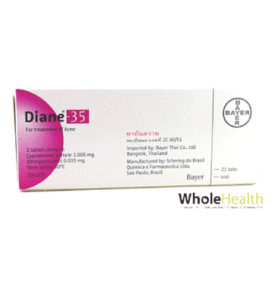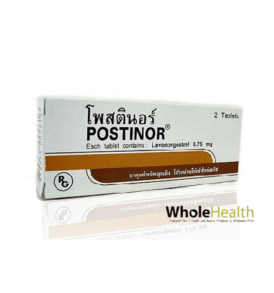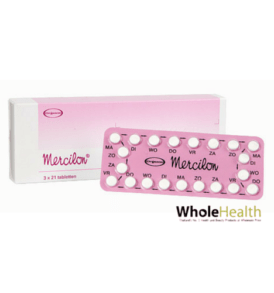Yasmin
$35.90
Yasmin Oral Contraceptive Pill for birth control contains synthetic versions of the naturally occurring female sex hormones, oestrogen and progesterone which is used to prevent the eggs to be fertilized in the ovary and, hence, prevent pregnancy. Please read below for product details and warnings.
Product Description
How does it work?
Yasmin tablets are a type of hormonal contraception commonly known as ‘the pill’ or combined oral contraceptive pill. Yasmin tablets contain two active ingredients, ethinylestradiol and drospirenone. These are synthetic versions of the naturally occurring female sex hormones, oestrogen and progesterone. Ethinylestradiol is a synthetic version of oestrogen and drospirenone is a synthetic form of progesterone.
Combined oral contraceptives like Yasmin work by over-riding the normal menstrual cycle. In a woman’s normal menstrual cycle, levels of the sex hormones change throughout each month. The hormones cause an egg to be released from the ovaries (ovulation) and prepare the lining of the womb for a possible pregnancy. At the end of each cycle, if the egg has not been fertilized the levels of the hormones fall, causing the womb lining to be shed as a monthly period.
The daily dose of hormones taken in the pill work mainly by tricking your body into thinking that ovulation has already happened. This prevents an egg from ripening and being released from the ovaries each month.
The hormones also increase the thickness of the natural mucus at the neck of the womb, which makes it more difficult for sperm to cross from the vagina into the womb and reach an egg. They also change the quality of the womb lining (endometrium), making it less likely that a fertilized egg can implant there.
What is it used for?
-
Contraception
Taking the contraceptive pill usually results in lighter, less painful and more regular menstrual bleeding. This means it is sometimes also prescribed for women who have problems with particularly heavy, painful or irregular periods.
How do I take it?
Yasmin is a monophasic pill. This means that each tablet has the same dose of hormones in it. One tablet is taken every day for 21 days and you then have a seven day break from pill-taking. During your seven day break, the levels of the hormones in your blood drop, which results in a withdrawal bleed that is similar to your normal period. You start the next pack after the seven pill-free days are up, even if you are still bleeding.
The tablets come in a calendar pack marked with days of the week to help you remember to take a pill every day for three weeks, followed by a week off. You will still be protected against pregnancy in your pill-free week, provided you took all the pills correctly, you start the next packet on time and nothing else happened that could make the pill less effective (e.g. sickness, diarrhea, or taking certain other medicines – see below).
You should try and take your pill at the same time every day; this will help you remember to take it. Each tablet should be swallowed with a drink. They can be taken either with or without food.
When can I start taking it?
Ideally, you should start taking this pill on day one of your menstrual cycle (the first day of your period). This will protect you from pregnancy immediately and you won’t need to use any additional methods of contraception. If necessary, you can also start taking it up to day five of your cycle without needing to use additional contraception when you start. However, if you have a short menstrual cycle (with your period coming every 23 days or less), starting as late as the fifth day of your cycle may not provide you with immediate contraceptive protection. You should talk to your doctor or nurse about this and whether you need to use an additional contraceptive method for the first seven days.
You can also start taking this pill at any other time in your cycle if your doctor is reasonably sure that you are not pregnant. However, if you start taking this pill at any other time in your cycle, you won’t be protected from pregnancy straight away and you will need to use additional contraception, eg condoms (or not have sex) for the first seven days of pill taking.
If you have given birth and are not breastfeeding, you can start taking this pill on day 21 after the birth. You will be protected against pregnancy immediately and do not need to use extra contraception. If you start taking it later than 21 days after giving birth, you will need to use extra contraception for the first seven days.
If you are starting this pill immediately after a miscarriage or abortion at under 24 weeks, you will protected against pregnancy immediately. If you start taking it more than seven days after the miscarriage or abortion, you should use extra contraception for the first seven days of pill taking.
What do I do if I miss a pill?
If you forget to take your pill at your usual time, take it as soon as you remember. A missed pill is one that is 24 hours or more late. If you miss a pill, follow the instructions below.
- One pill missed
If you forget to take ONE pill, or start your new pack one day late, you should take the pill you missed as soon as possible, even if this means taking two pills at the same time. Then continue taking the rest of the pack as normal. You will still be protected against pregnancy and you don’t need to use extra contraception.
- Two or more pills missed
If you forget to take TWO or more pills, or start your new pack two or more days late, you won’t be protected against pregnancy. You should take the last pill you missed as soon as possible, even if this means taking two pills at the same time. Leave out the other missed ones. Then continue to take your pills, one every day, as normal. You should either not have sex, or use an extra barrier method of contraception, eg condoms, for the next seven days.
If there are fewer than seven pills left in your pack after your last missed pill, you should finish the pack and then start a new pack straight away without a break. This means skipping your pill-free week.
If there are seven or more pills left in your pack after your last missed pill, you should finish the pack and have your seven day break as usual before starting the next pack.
If you had unprotected sex in the seven days before you missed pills, you may need emergency contraception (the morning after pill). Ask for medical advice.
If you are confused about any of this, you can get individual advice for your circumstances from your doctor, pharmacist or local family planning clinic.
What if I have vomiting or diarrhoea?
- If you vomit within two hours of taking a pill, it may not have been fully absorbed into your bloodstream. You should take another pill as soon as you feel well enough and take your next pill at your usual time. You should still be protected from pregnancy. However, if vomiting continues for more than 24 hours, this may make your pill less effective. You should keep taking your pill at your normal time, but treat each day that you have vomiting as if you had forgotten to take a pill and follow the instructions under “what do I do if I miss a pill” above.
- If you have very severe diarrhoea for more than 24 hours, this may make your pill less effective. You should keep taking your pill at your normal time, but treat each day that you have severe diarrhoea as if you had forgotten to take a pill and follow the instructions under “what do I do if I miss a pill” above.
Warning!
- This contraceptive pill will not protect you againstsexually transmitted infections, so you may still need to usecondomsas well.
- Women using this contraceptive for the first time may experience menstrual irregularities such as spotting, breakthrough bleeding or missed periods. Consult your doctor if any breakthrough bleeding persists. If you don’t have a withdrawal bleed for two consecutive months you should do apregnancy testbefore starting the next month’s contraceptive cycle.
- It is important to be aware that, compared with women who do not use these contraceptives, women taking the combined pill appear to have a small increase in the risk of developing a blood clot in a vein, eg in the leg (deep vein thrombosis) or in the lungs (pulmonary embolism), or a blood clot in an artery, eg causing astrokeor aheart attack. This risk is greater in certain groups of women, particularly smokers and women who are obese – see cautions and not to be used in below). Yasmin has a slightly higher risk of blood clots in the veins than ‘second generation’ pills, for example those containing levonorgestrel or norethisterone; its risk is similar to ‘third generation’ pills that contain desogestrel or gestodene. However, pregnancy carries a much higher risk of blood clots than any pill, so the potential risk must be weighed against the benefits of the contraceptive. You should discuss this with your doctor.
- The risk of blood clots forming in the veins (venous thromboembolism) while taking the pill may be temporarily increased if you are immobile for prolonged periods of time, for example if you have amajor accident or major surgery. For this reason, your doctor will usually recommend that you stop taking this pill for a period of time (usually four to six weeks) before any planned surgery, particularly abdominal surgery or orthopaedic surgery on the lower limbs (but not before minor surgery like teeth extraction). You will also need to stop taking this pill if you are going to be immobile for long periods, for example because you are confined to bed or have a leg in a plaster cast. You should not start taking the pill again until at least two weeks after you are fully mobile.
- There may also be an increased risk of blood clots in the veins if you aretravellingfor long periods of time where you will be sat still (over three hours). The risk of blood clots during long journeys may be reduced by appropriate exercise during the journey and possibly by wearing elastic hosiery. You should ask your doctor or pharmacist for more advice.
- It is important to be aware that women using hormonal contraceptives appear to have a small increase in the risk of being diagnosed withbreast cancer, compared with women who do not use these contraceptives. Women who use oral contraceptives for longer than five years may also have a small increase in the risk of being diagnosed withcervical cancer. However, these risks must be weighed against the benefits of using the contraceptive, which include a decrease in the risk of cancers of the ovaries and endometrium (womb). You should discuss the risks and benefits of the pill with your doctor before you start taking it.
- Stop taking this medicine and inform your doctor immediately if you get any of the following symptoms: stabbing pains and/or unusual swelling in one leg, pain on breathing or coughing, coughing up blood, sudden breathlessness, sudden severe chest pain, migraine or severe headaches, sudden disturbance in vision, hearing or speech, sudden weakness or numbness on one side of the body, fainting, collapse, epileptic seizure, significant rise in blood pressure, itching of the whole body, yellowing of the skin or whites of the eyes (jaundice), severe stomach pain, severe depression, or if you think you could be pregnant.











Reviews
There are no reviews yet.